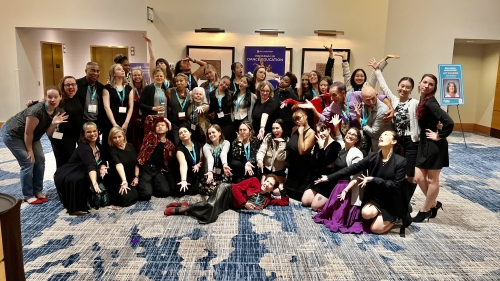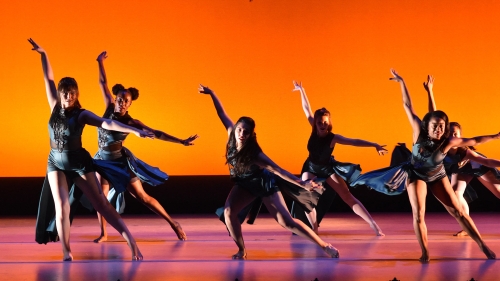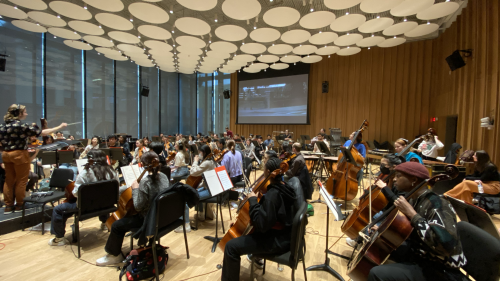
Patricia Cohen (center lying down) surrounded by her students and peers after receiving the Lifetime Achievement Award.
We congratulate Dance Education adjunct faculty member Patricia Cohen for receiving the 2024 Lifetime Achievement Award from the National Dance Education Organization.
What does receiving the 2024 Lifetime Achievement Award mean to you personally and professionally?
Personally, the Lifetime Achievement award validates the work I’ve done in classrooms, studios, and for allied organizations to promote and implement issues of equity and inclusion in dance education.
Professionally, the award reflects my core values as an educator: reciprocal teaching and learning, cultural integrity and culturally relevant pedagogy, and community versus hierarchy as a guiding principle. Hopefully, the award gives credibility to dance educators in all environments who advocate for curricula that promote social justice issues and historical accuracy.
Can you share some key moments or milestones in your career that you believe contributed to this recognition?
- A friend asked me to teach her college courses while she was on sabbatical; I had no teaching experience in academia. To my surprise, I enjoyed exploring various approaches to the course content and to student interactions.
- As an older student in the Teachers College/Columbia MA dance education program, the director, Susan Koff, gave me the opportunity to rethink and implement new pedagogical approaches as the teacher of an undergraduate jazz dance course.
- I strongly advocated for and helped develop recognition for jazz dance as an art and as valid course material in academia.
Looking back over your career, is there a particular project or initiative that stands out as especially meaningful or transformative for you?
- The site coordinator for NDEO’s 2009 annual conference gave me insights because of over-reach. Taking risks is an exceptional teaching tool.
- Organizing a small group of jazz dance aficionados within NDEO; together, we have advocated for and achieved recognition for jazz dance as a valid art and solidly academic dance form, worthy of inclusion in schools and institutions.
Who or what has been your biggest inspiration throughout your career in dance and dance education?
At the risk of omitting important influences, I will include
- Jane Bonbright and Rima Faber, who were the first directors of NDEO. They taught management and organizational skills mixed with compassion and passion for developing the field.
- Susan McGreevy-Nichols, who convinced me that pursuing the MA degree would be “good for me.”
- The late Helene Scheff, who deeply believed in inclusion and that every child deserves the Chance to Dance.
- Baba Chuck Davis, with whom I traveled and danced for three weeks in the Gambia, West Africa. The experience transformed my understanding of pedagogy within the Africanist aesthetic.
- Karen Hubbard, who introduced me to rooted jazz dance.
- Acceptance in the rooted jazz dance community, including the editors and contributors to Jazz Dance: A History of the Roots and Branches and Rooted Jazz Dance: Africanist Aesthetic and Equity in the 21 st Century.
- Finally, and critically, all the former NYU dance ed students who have remarked on the influence I’ve had on their own teaching.
What about the NYU Dance Ed Program makes it stand out from others?
I can only speak to our values: We value our students equally as artists, scholars and educators. We mentor them, give them considerable autonomy based on our belief of reciprocal teaching and learning, expose them to leaders in the field, offer networking opportunities through courses and through conferences. We honor our students, faculty and staff for their varied backgrounds and perspectives. We prefer collaboration to competition.
What do you think is the most pressing challenge facing dance educators today, and how do you address this challenge in your own teaching?
- Recognition as an art form in education, equal to the other arts.
- Funding for the arts, and particularly, for dance.
- Equity and diversity in dance education (improving).
- Insufficient engagement in the organizations that support and advocate for dance education.
In my practice, I address these challenges, first, by naming them. We can only change things once we have named and faced them.


